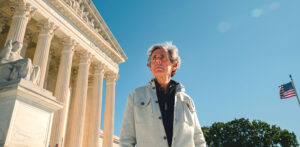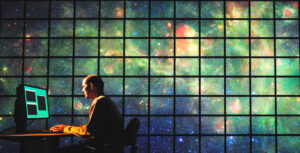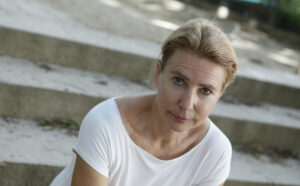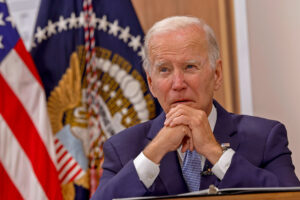Richard Dawkins is best known for his controversial advocacy of atheism, especially in The Selfish Gene (1976) and The God Delusion (2006). But could the pugnacious evolutionary biologist have a romantic side? His new podcast, The Poetry of Reality, suggests he might.
Earlier this week, he visited the UnHerd Club for a wide-ranging interview about God, his love for WB Yeats, the heroism of JK Rowling, and how he changed his mind about vaccine hesitancy. Below is an edited transcript.
Freddie Sayers: Richard Dawkins, welcome to UnHerd. You’re launching a podcast, “The Poetry of Reality”. Why?
Richard Dawkins: I’ve always felt that science is poetic, and deserves to be treated as a part of our culture. The magnificent fact that the universe has given rise to us, supremely complicated beings capable of even understanding where we came from, ought to be a topic of great literature. Science is the poetry of reality.
FS: Am I wrong to detect a softening in your later years? The choice of podcast name seems designed to give the impression that you’re a more romantic, less rigidly rational spirit than people realise?
RD: I think I’ve always been a romantic spirit and I think that’s what science inspires, or ought to inspire, as opposed to the cold, hard, dispassionate image that science can be mistaken as projecting.
FS: We’re talking at a time in which once-unassailable scientific ideas have become… complicated. Gender is an obvious one. Do you worry that the scientific institutions you cherish have become overly attuned to faddish politics, and that science risks compromising its reputation?
RD: Certainly, I have noticed that some of the leading scientific journals have capitulated to political pressure to become unscientific, and to betray what is an obvious scientific dichotomy between male and female. This seems to have been betrayed for political reasons by people in editorial positions in leading scientific journals who ought to know better.
FS: Another example might be Nature magazine, which has stated that part of its mission is to work to correct racial injustices — it seems to be a political agenda rather than a scientific one.
RD: There’s an analogue of original sin, that white people are expected to feel guilt for what their ancestors — or maybe just people of the same skin colour — did to other people of a different colour. It’s as though we are supposed to inherit the guilt of people of the past, just because we have the same colour skin as they did. And that is, I think, racism. It is actual racism to confer guilt upon people because of the colour of their skin.
FS: So would you prefer a completely colour-blind world, as far as institutions are concerned? This is controversial in the United States right now, with the Supreme Court reconsidering whether affirmative action has a place in education. For years, admissions criteria for university science departments have considered an applicant’s race. Where do you stand on that?
RD: If I were in favour of any sort of affirmative action, it might be in favour of those who have been disadvantaged in their own past, through poverty. And if they happen to be black, fair enough — but simply because they’re black? No, that’s the wrong sort of affirmative action. That is racism.
FS: And if that resulted in fewer black people going to elite colleges, you’d be fine with that, on the grounds that places would be going to the most deserving candidates?
RD: Well, they would probably be the people most able to benefit from those places, yes. But there is also something to be said for bending over backwards to help people from a disadvantaged background who have a genuine ability that hasn’t had a chance to flourish — and if they were to get to Harvard, then they might be able to. And so I am in favour not of affirmative action but what I would call ‘intelligent looking’ for talent, which is what we try to do at Oxford. In my time, we did, anyway. We tried to recognise that somebody might be not so well groomed for an entrance exam or for an interview, but who showed signs of genuine talent.
FS: You’ve also been critical of New Zealand schools including indigenous origin stories in science classes. How do you think people of a scientific mindset should treat the irrational, or intuitions for which there is no clear proof? Is it not possible that poetic and symbolic ways of describing such things get us close to a different kind of truth?
RD: My favourite poet is W.B. Yeats, a notorious mystic. Obviously, I have no sympathy whatsoever with his belief in fairies and things like that, but I resonate with his poetry. I think it’s wonderful. It’s hard for me to explain what I mean, but I suppose that’s the point. I’m not trying to be a scientist when I do that. I’m resonating as a human being. In the early poems — “The Wind Among the Reeds”, for example – I empathise with this lovelorn young man, struggling with his feelings of lost love. And I get that, but not as a scientist.
FS: But those feelings of being a lovelorn young man are true, are they not? They exist in the universe?
RD: They are true for this subject, what’s going on in his own mind, yes.
FS: Hearing you talk about a Yeats poem, you don’t sound that different to religious people. Just as when you talk about the beauty of the natural world and the miracles of science — although you might not use the word “miracle” — it feels as though you’re moved by that. Perhaps the difference between you is more a question of language?
RD: I think there’s something wrong with that idea. According to supernaturalism — which is what I take to mean religiousness — there is something beyond physics, beyond the material world, which I do not believe. I do not believe in anything beyond the material world, no matter how poetic you feel, no matter how much you’re in love, or no matter how deeply you feel emotionally about looking at nature, looking at fields of wheat, looking at the stars. These are all human reactions, which I feel as strongly as anyone. But there is nothing supernatural about that.
As a human being, when contemplating the Milky Way, I get a feeling in the pit of my stomach. There’s nothing supernatural about that, it’s something in my nervous system. That’s not to demean it — it feels real to me. But it’s not truth in the scientific sense, which really is actually physically true about the material world.
FS: In the realm of theoretical physics, for example, there are whole dimensions of the universe that we simply don’t know how to describe yet. Is there not a chance that some of those feelings might be perceiving physical realities that we don’t yet have a way to analyse?
RD: As it happens, this evening I’m going to a meeting in London with Lawrence Krauss, the American theoretical physicist, who has just written a book called The Known Unknowns, which is about all that we don’t yet know. And physicists are proud to admit that there’s a lot that they don’t know, but they’re working on it. It is entirely possible — probable, even — that there are beings in the universe who already do understand things that are beyond our understanding, and that our brains simply aren’t big enough to understand these profundities about the universe. But to somehow equate those with mystical feelings that you get when you’re in love, or when you contemplate a rose, or religious feelings, that’s a naive confusion.
FS: Your work on evolution and natural selection holds that most things about human nature and the human body, in our evolved cells, are there for a purpose.
RD: Yes — and I might be in a minority of biologists for believing that. For that reason, I’ve been called an ultra-Darwinian. Quite a lot of other biologists feel there’s a lot in life that is not actually Darwinian, in the sense that it’s not actually designed by natural selection, but is there by chance.
FS: In which case, should we not view the religious impulse, or mystical impulses, and those feelings that we were just talking about, with more respect? Should we not view them as more likely to be more intelligent than purely a kind of mistake, possibly being wiser and more purposeful than you have been prepared to admit?
RD: Not wiser and more purposeful, but possibly there for a reason. I readily agree that, because it’s a human universal, pretty much, and therefore logically that means that it is highly probably that it is of Darwinian advantage. That, I get. It doesn’t mean religion is true, though. I mean, you could say, the tendency to be religious, the tendency to believe in something supernatural, the tendency to think there’s something higher than you, the tendency to think that people also can connect… all this could have been built in by natural selection.
I often suggest that this could be because children have been naturally selected to be respectful of what their parents tell them, what their culture tells them, because they need that in order to survive. Religion flourishes because children who are vulnerable, in a dangerous world, need to be instantly obeying their parents advice, not to endanger themselves. You don’t question what your parents say, you just believe what they say, which means the child mind is pre-programmed by Darwinian natural selection to be credulous of what elders tell them. And that is fertile ground for falsehood, as well as truth.
FS: But if it’s there by natural selection, it must be a net positive?
RD: A net positive in a survival sense, yes – but it doesn’t make it true. It’s not true that if you sacrifice a goat at the time of the full moon, you will cause the crops to succeed. But it’s a net positive in the sense that it’s a by-product of the impulse to obey authority, because the impulse to obey authority, in general, is a net positive.
FS: In that context, the latest mostly secular generation could be seen as a species-wide experiment. It hasn’t happened before in history — and you had a fair bit to do with bringing it about. Judging on the evidence, how do you think the secular experiment is going?
RD: The statistics I’ve seen suggest it is slowly getting better. The statistics I’ve seen suggest that the number of people who profess some kind of religion is going down. It’s now below 50%, which is the first time that a British census has shown that to be the case, which I think is good. Similarly in America, which is lagging behind, in this respect, but it’s still going in the right direction. Those are the only figures I’ve seen and, all I can do is offer you my intuition, which is worthless.
FS: There’s a book by Tom Holland called Dominion, which has been very influential in suggesting that a lot of what we consider to be secular Western ways of thinking on morality is still drenched in Christian thinking. So perhaps, although people aren’t describing themselves as religious in the census, they’ve just moved those religious intuitions into other realms?
RD: Yes, I think that’s very likely true. You can make a good religious case for the trans debate. I make an analogy with the Catholic doctrine of transubstantiation, whereby the wine in the Aristotelian accidentals remains wine but, in its true substance, becomes blood. Similarly, the trans person: he has a penis, but that’s a mere accidental, and in true substance he’s a woman. I mean, that’s a perfect analogy to transubstantiation. It even begins with the same prefix.
FS: So which is better, then? We’ve gone through this whole process, we’ve had a whole generation who’ve now been brought up reading your books, and Christopher Hitchens, who are now ardent and proud atheists, and then they end up believing things like you just described. And that has all sorts of societal repercussions. Should we now look back on the New Atheist movement with regret?
RD: No, I don’t get that at all. It’s just an interesting analogy to point out that there is a strong religious element to a current political fad. So what?
FS: The question is: empirically speaking, between conventional religion and what appears to be its successor ideology, which will be proven by history to be better for the flourishing of the species? Early signs are that this new kind of religion, which thinks it’s secular, has some major problems.
RD: Well, if you care about the flourishing of the species, yes, but I care about truth.
FS: So you don’t care about the flourishing of the species?
RD: Well I do care about it as a human being, but more deeply I care about truth.
FS: And if your sense of truth would lead to the annihilation of the species, would you be content with that?
RD: No I would not be content with that. But I’m pretty sure it wouldn’t happen. I think that truth actually is a genuine value. I believe that a true scientific outlook on the world would actually be best for the flourishing of humankind.
FS: We have to talk about the most recent scientific controversy of our age: Covid. It feels like we are now emerging from the Covid years, when our trust in science was enormously damaged. Millions of people now intuitively distrust what they are told by scientific authorities. Do you think Covid was a moment of scientific glory, or something more problematic?
RD: I think glory, with regards to the unprecedented speed that vaccines were developed. And that is a tribute to molecular biology. It was possible, almost instantly, to sequence the genome of the virus, and to transmit the genome directly to labs all over the world, who set to work developing vaccines with, as I said, unprecedented speed. That is magnificent. Whether humans mistrust or trust science, that’s their business.
FS: But the vaccines were enormously over-promised in terms of their efficacy. They were originally sold to us as being 95% effective in preventing infection. That was then endlessly revised downwards and, in the end, we were told vaccination didn’t stop transmission, it only improved outcomes for vulnerable patients.
RD: The speed with which things were happening means that it’s very difficult for people entrusted with authority to give advice. And normally, there’s much more time in order to examine all the evidence and give balanced, wise advice. When you’re required to give advice almost instantly, there inevitably are going to be mistakes.
FS: During the pandemic, you condemned people who were sceptical about the pandemic response. You tweeted that: “Some faith heads have a ritual of handling snakes, believing faith will protect them. When they’re bitten, they deserve it, they alone suffer. Vaccine refusal is different. Others are endangered. It’s as though their faith told them to release rattlesnakes in supermarkets.” This was April 6, 2021. Your vilification of people who were hesitant about taking the vaccine, in retrospect, seems too much, doesn’t it? Do you take that back?
RD: Well, I had become aware of the conventional wisdom about vaccination, which is that it’s a matter of altruism, because it’s not simply a matter of saying: “This is my private business, whether I’m vaccinated or not.” And in the case of the measles vaccine, for example, it really is a matter of altruism, because if you don’t get vaccinated, then then you are part of the problem if there’s a measles epidemic. And I thought that that would be the case with Covid. Now, it’s not entirely clear that that was right. And so, to that extent, I would take that back, yes.
FS: Do you also think that Covid showed how vulnerable scientists and institutions such as universities have become in this social media age — to peer pressure, to a fear of being cancelled and of being on the wrong side of mainstream thought?
RD: Yes. There are some heroic scientists who go off on their own and don’t need grants and just get on with their research — people like James Lovelock, who I’ve criticised on other grounds, but…
FS: Recently, universities have not been good at defending their own when they come under assault, on social media and elsewhere, for taking an unpopular position. The trends we saw with American universities during Covid, but there are lots of other examples. Professor Kathleen Stock springs to mind. Surely we can be constructively critical of universities for this?
RD: I think we can, and I think Kathleen Stock is a very good example of somebody who’s been appallingly treated. I think she’s a real hero. I think J.K. Rowling is a real hero. She’s not at a university, but she’s another one. Yes, I’ve been rather shocked at the way universities have not stood up to a rabble, a lynch mob, really, going after people like Kathleen Stock. But you can also sympathise with a university vice-chancellor with a baying mob of students after their blood. It’s difficult, but I think in that case they should hold the line.
FS: Another concept you’ve defended recently is AI, and whether we might be leaving human nature behind altogether, either through some kind of AI future, or via extraterrestrial life. With your materialist hat on, explain how you think AI could supplant organic life?
RD: Well, the brain is a material object — and what it does is, although we don’t understand it fully yet, it must have a scientific explanation. And it must be the case that whatever the brain can do, in principle, could be done by an AI simulation. So, an artificial intelligence must be capable of doing what the human brain can do — and there’s no obvious reason why it shouldn’t be greatly superior to it.
It is conceivable that an artificial intelligence could greatly surpass what the human brain can do. And in many ways, that’s a very frightening prospect. People, many people, are very frightened of it. I haven’t decided whether I’m frightened of it or not. I think I could imagine it going both ways. But, as a materialist, I can’t deny that it’s possible.
FS: People might also be surprised by how much credence you give to the possibility of extraterrestrial life. How likely do you think it is that life exists on other planets?
RD: Very likely — especially when you think of the sheer number of opportunities in the universe for it to exist. It has arisen here and evolved to the point where it can understand its own existence. That was a ridiculously improbable event, but it happened. So why deny that it has happened anywhere else in the universe?
FS: So, on the balance of probabilities, we’re talking more than 50% likely, in your estimation, that there is life beyond our own planet?
RD: Yes. And I would make a distinction between life existing elsewhere, which is far more probable, than actual intelligent life, because one’s got to come from the other. We might well discover intelligent life through radio communication, but we will never be visited by it. Flying saucers, no — very unlikely. But visitation by radio communication, electromagnetic waves , that’s not totally unlikely. And I think that SETI, the search for extraterrestrial intelligence, is a worthwhile enterprise that should be pursued and funded.
FS: You don’t think interstellar travel will become possible through some breakthrough in physics?
RD: Well, that’s very, very far off in the future, because of the huge distances involved. So far, we are waiting for interplanetary travel within the solar system. Light years is a very long distance for solid, physical objects to travel.
FS: So if Elon Musk succeeds at getting human beings to Mars in your lifetime, would you volunteer for his next flight?
RD: No, I wouldn’t volunteer… actually perhaps yes. If I knew I was dying, it might be the last thing I’d do.
* “The Poetry of Reality” With Richard Dawkins is available to download now.
Disclaimer
Some of the posts we share are controversial and we do not necessarily agree with them in the whole extend. Sometimes we agree with the content or part of it but we do not agree with the narration or language. Nevertheless we find them somehow interesting, valuable and/or informative or we share them, because we strongly believe in freedom of speech, free press and journalism. We strongly encourage you to have a critical approach to all the content, do your own research and analysis to build your own opinion.
We would be glad to have your feedback.
Source: UnHerd Read the original article here: https://unherd.com/





